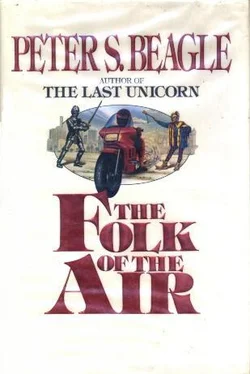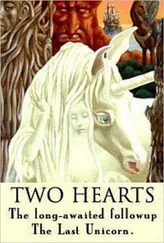The man dropped lithely down onto his bare heels, hugging himself and rocking as he cried, “Oh, well hit, fair on the mazzard, squash on the old beezer. What an excellent savory talk is this of yours, after all.” His own speech was fast shedding its daintily wicked music; Farrell could hear the vowels collapsing like pricked balloons, and the lilting drawl being overtaken by the concrete consonants of Cedar Rapids. Nicholas Bonner said, “Well, you’re wondrous foolish, but not altogether fool. True enough, the last flaming breath of Master Giacopo did consign his betrayer to such night and silence as had me near weeping to join him in cozy hell. Oh, he knew how to venge himself, no man better—I’d found that out while he was yet alight.” The same freezing, measureless despair blew through his voice for a second time and was gone.
“So if it hadn’t been for me,” Aiffe said. Farrell was too far away to read her expression, but he saw the difference in the way she stood, pushing back her heavy hair. She said slowly, “So you owe me one, don’t you? You really owe me a big favor.”
Nicholas Bonner laughed so hard this time that he had to prop himself with his hands to keep from falling over. “Now truly, that deserves my best effort at the local tongue.” He cleared his throat, still squatting in the moonlight with his hands flat on the ground, like a golden frog. “Kiddo, just by not being a demon I’ve done you a better turn than anyone’s had from me in a thousand years. Let me tell you, if you’d caught the notice of the humblest, feeblest, most wretched midge of a demon that was ever spawned—girl, the least of those would have swarmed up your two-bit charm like a ratline and swallowed you whole before you could wet your pants. Oh, we’re more than quits, take my word for it.”
“If I took people’s words for things, you wouldn’t be here,” she answered. “Just don’t worry about me, all right? I take care of myself, I can handle anything I can summon.” Her hands were closed at her sides, and she leaned toward the crouching man. She said, “I’ve used that spell three times, and each time something’s moved , somebody’s come to me. Not a demon—okay, I haven’t got that down yet—but I always get somebody. I’m Aiffe, you snotty dork Nicholas Bonner. I can make things move.”
Nicholas Bonner stood up then. His naked body cast a pale, crooked moonshadow behind him. Farrell watched it wriggle toward him past the blackened redwood stumps; when it touched his ankle, he was certain that he could feel himself connected to Nicholas Bonner, spine linked to spine, like electrodes. He tried to step away from the shadow, but it moved with him as if it were his own.
“Aye, so you can,” Nicholas Bonner said to Aiffe at last. His voice had turned thoughtful and cautious, and there was no laughter in it now. He said, “Indeed, you do have a sort of skill, and no denying it. But to what end, that’s the issue—to what end?” When the girl did not answer him, he continued impatiently, “Come on, sport, talk up. What do you want that you think a demon could give you?”
Aiffe giggled quite suddenly, shrill as a tree frog. “I want to mess with people,” she said. “I just want to get even, that’s all.”
Farrell felt Nicholas Bonner smile then; the warmth spread through him thinly, like one of the tingling guilts of childhood, forcing him to smile, too. Nicholas Bonner said very gently, almost wonderingly, “Why, we are well met.” He held out his arms to her and moved lightly across the redwood grove, and his shadow danced after him.
She did not back away this time, but Farrell did, free of Nicholas Bonner’s shadow and of any desire to watch them further. He duck-walked clumsily until he was clear of the trees, then stood up, shook himself, turned and blinked straight into the chestnut-brown eyes and small, closeclipped beard of the black Saracen. The Saracen said politely, “Ah. There you are.”
“I doubt it,” Farrell said sincerely. Behind him, in the redwood grove, Aiffe laughed twice, sounding frightened and happy. The Saracen seemed not to hear her. He said, “Hey, the noble multitude stompeth and yelleth for encores. Time for your second set.”
Farrell grinned until his face hurt, absurdly grateful to see him. “What happened to the castle talk? You could lose your union card, talking like that.”
“I’m a bard, man,” the Saracen said. “They make allowances for me. I give them whole ballad cycles in Gaelic, Arabic, Welsh, Danish, Old English, Anglo-Norman, and great big chunks out of Carmina Burana . They make allowances.”
Aiffe’s laughter ended in a sharp, lonely cry; but the Saracen already had an arm through Farrell’s arm and was turning him back toward the clearing, chatting easily and pleasantly all the while. “Bards have it made, anyhow. Catch one of the bardic festivals, you’ll see what I mean. Everybody else has to stay in character, but if you’re competing, hell, you get to do Eskimo Nell, Stagolee , anything you want. One time I recited this whole huge epic about King Kong, did it all in iambics and terza rima . Took me damn near an hour to get through.”
He kept up a graceful patter of conversation as they walked, volunteering, among other things, that he had been a charter member of the League for Archaic Pleasures. “Me and Simon, Prester John, Olaf, maybe a dozen assorted Middle Ages freaks, all swashing away at each other in Garth’s backyard. No rules, no structure, just get together now and then and go at it. I mean, we had folks making morgensterns out of croquet balls and bicycle chains in those days, using car antennas for flails. So there had to be some rules after a while, and then people started in bringing their families, and there had to be something for the women to do. The League would never have happened without the women.”
Farrell said, “But the fighting’s still what matters.”
The Saracen shook his head. “Not the way you mean. We’re a theater, we give someone like Elizabeth a stage where she gets to be one bad, sexy, mysterious Blood Countess from Transylvania—and believe me, she is none of the above as a regular thing. Or you take Simon Widefarer. Simon’s a lawyer, contracts or something. Hates it. Hates himself for being scared to tell his parents he didn’t want to be a lawyer, hates himself for being scared to quit cold and start all over running some shoestring airline in Belize. But here—here he’s a condottiere , a free captain, best fighter in the League after Egil Eyvindsson, and he’s not afraid of anything. All we do, we give him a place to be Simon Widefarer on the weekends.”
“Do you have a place for Nicholas Bonner?” Farrell asked quietly. The Saracen smiled as vaguely and benignly as though he had not quite heard the question and could not bring himself to admit it; but his arm jumped once against Farrell’s, and his effortless amble quickened slightly. Farrell asked, “Who are you? What does this handy little repertory company give you?”
The Saracen wagged a forefinger and frowned with such elegant severity that Farrell had no idea whether he was being admonished, reproached, or very strangely teased. “Two entirely different questions, my good minnesinger. Who I am is a black man fool enough to have a classical education, and there are a lot of people at this dance wouldn’t even tell you that much about themselves. Sort of like the Gold Rush, you know, you don’t want to be asking somebody what his name was back in the States. Names are magic, names are all the magic there is, every culture knows that. Got any sense, you don’t even let the gods know your right name.”
He halted suddenly and smiled at Farrell in quite a different way—the thin, bulging grin of something that might eat grubs and shoots and blackberries most of the time, but not always. “But who I am here is Hamid ibn Shanfara, poet and son of an outlaw poet, historian, storyteller, Royal Keeper of the Lists and Legends. Some places south of the Sahara, they’d call me a griot .” His small, smooth bow exactly followed the curve of the dagger hanging at his waist.
Читать дальше












